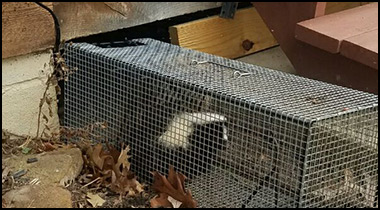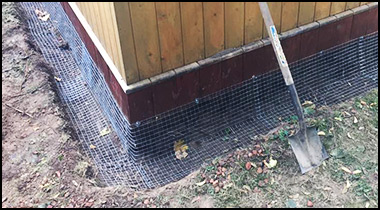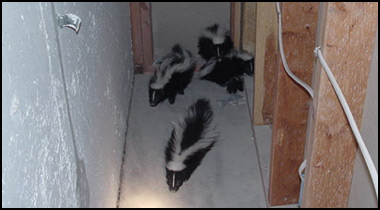Baton Rouge Skunk Removal Resources
Skunk Rehabber - East Baton Rouge Parish Animal: (225) 774-7700
Free East Baton Rouge County Animal Services: 225-774-7700
Humane Wildlife Trappers of Baton Rouge: 225-289-4143
If you need skunk control in Baton Rouge, you have a few options. First, you can attempt to solve the skunk problem yourself by reading our do-it-yourself guide. If you need outside help, you can also call East Baton Rouge County Animal Services to see if they have any free resources or help for you - however, they primarily deal with dog and cat concerns. You can also call a local Baton Rouge wildlife rehabber, as they are typically a great resource for advice that is in the best welfare of the animal. If as a last resort you must hire a professional company, we recommend Humane Wildlife Trappers of Baton Rouge at 225-289-4143. To learn more about them or check their skunk removal prices, visit batonrougepestanimal.com.

Baton Rouge Skunk Trapping and Removal

Preventative Repairs & Exclusion

Baton Rouge Skunk Removal From Structures
In many cases, preventative measures can solve your Baton Rouge skunk problem - keep garbage secured, pet food indoors, and most of all when it comes to skunks, secure the perimeter of your shed, porch, deck, or house with a barrier - lattice or steel mesh is good, and it keeps Louisiana skunks from going under the structure. If trapping and removal of the skunk is the only option you have, please do so with the help of a local agency or professional company who knows how to do it humanely and legally. Browse the resources of this site for more educational information.
Frequently Asked Questions:
Prevention: How to Keep Skunks Away
What to do with a skunk after I catch it?
Is it legal for me to trap a skunk?
How to remove skunk odor
Is a skunk active during the daytime rabid?
What does skunk feces look like?
Baton Rouge Skunk Control Information: How to avoid getting sprayed by a skunk
If you come across a skunk and that appears to be agitated and aggressive, you could become a victim of its infamous spray. If you pay attention, there are ways to avoid getting sprayed. In an attempt to keep from discharging their scent, a skunk will run threaten you with a series of moves intended to intimidate you and frighten you off. Because spraying leaves them mostly defenseless until they can "reload" they prefer to try and scare predators off with a series of moves that usually including stomping on the ground and slapping their tail, growling, hissing, or an awkward handstand-dance. This is your chance to get away unscathed. If you see a skunk, and think it is going to spray, watch its stripes! The stripes that run down skunks' back actually point to the spray area where the stinky spew comes out!
An adult Skunk can spray its noxious spew close to ten feet directly from their anal glands. The offensive odor can linger for days, even weeks. This spray irritates sensitive tissues, can sometimes cause temporary blindness, and results in severe skin irritation. When a skunk sprays, you can often smell the scent from up to a mile downwind. The gaseous compound sprayed by a skunk is also proven to be flammable. This interesting fact is a scientific side effect that comes from spraying a combustible sulfur based compound of thiols, the elements found most commonly in onions and garlic.
A recent study conducted in 2014 found that a skunk's stinky spray is a direct result of the animals foraging habits. Any Animal that hunts in the daytime is more likely to be attacked by carnivorous birds such as hawks, falcons, or eagles. Their defense is a keen ability to watch the skies for signs of danger. Skunks however, are nocturnal and solitary, so the greatest danger for them is terrestrial (ground) attacks. Their main defense is their ability to spray a potent, irritating, noxious substance thereby temporarily stunning predators and giving the skunk a chance to escape. Here's a fun fact: The Latin name given to the skunk family is Mephitidae; the actual translation means, "stink."
Should you be unable to avoid being sprayed by a skunk, you can alleviate the smell. You must alter the chemical construct of the natural thiols. This can be easily done by washing in a simple mixture of baking soda and hydrogen peroxide
Remember, for free services you can try (225) 774-7700 or 225-774-7700, but if you need to pay for professional help, check the prices at the batonrougepestanimal.com website. Or follow our do-it-yourself guide!

